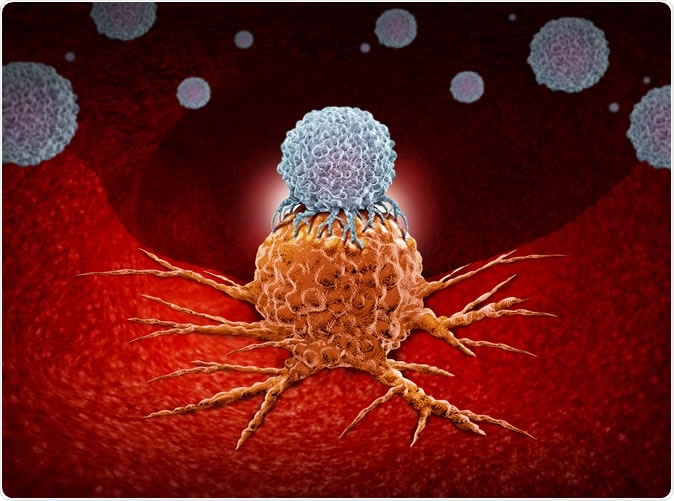The white blood cells are potent fighters that protect the body against foreign invaders, including pathogens and cancer cells. Scientists have found that the presence of B cells, which are powerhouses, in tumor cells, combat the disease from within.

Immunotherapy as a human immune system therapy concept as a biomedical or biomedicine oncology treatment using the natural cancer fighting properties of the body. Image Credit: Lightspring / Shutterstock
The chances of a patient responding to immunotherapy may rely on B cells in the tumor, which are found within specialized immune-cell clusters called tertiary lymphoid structures (TLS), according to three new studies by researchers at The University of Texas MD Anderson Cancer Center.
Cancer is a health condition wherein the abnormal cells in the body grow uncontrollably, often due to mutations in genes. This mutation triggers the acceleration of cell division rates, inhibiting the normal control of systems, including cell cycle arrest or programmed cell death or apoptosis. In cancer cell proliferation, old cells do not die, rather, they grow out of control and forms new, abnormal cells. When these abnormal cells accumulate, they form a mass of tissue, known as a tumor.
The three studies, published in Nature, reveal how B cells, which are a type of immune cells that produce antibodies, in the compartment or TLS, can give a glimpse of response to checkpoint blockade in patients with cancer, particularly soft-tissue sarcomas, renal cell carcinomas (RCC) or kidney cancer, and melanoma, a deadly type of skin cancer.
B cells in tumor cells
Currently, immunotherapies work by bolstering immune cells known as killer T cells to combat cancer, but only 20 percent of people with the disease benefit from the treatment. The researchers wanted to focus on other immune cells in the tumors to see whether they might help improve disease outcomes.
The three studies wanted to shed light on the role of B cells since in the past, the presence of these cells in tumors has been dubbed as a predictor of heightened patient survival chances. However, there were reports of both anti- and pro-tumor roles for B cells.
One study, led by Dr. Jennifer Wargo of the MD Anderson Cancer Center, involved bulk RNA sequencing on cancer cells from a cohort of melanoma patients from a neoadjuvant immune checkpoint blockade (ICB) trial conducted in the past. They discovered that the B cell markers were the most differently expressed genes in the tumors of the patients who responded to the therapy than those who didn’t respond.
Another study, by Dr. Wolf Fridman of INSERM, showed how the researchers examined the variability of clinical response of patients diagnosed with soft-tissue sarcomas have to treatments like ICB. Aside from this, the team worked on gene expression profiles in more than 600 tumors in various subtypes of soft-tissue sarcoma and the microenvironment in each tumor.
The study researchers said that the work confirms the immune subtypes in patients with soft-tissue sarcoma. The findings unveiled the possibility of B-cell-rich tertiary lymphoid structures or powerhouses to direct decision-making in treating patients. They added that the findings of the study can help open the door for formulating new treatments for other diseases as well.
The third study, undertaken by researchers at the Lund University, investigated the role of B cells in fighting the tumor. They discovered that the co-occurrence of tumor-related CD20-positive B cells and CD8-positive T cells was tied to better treatment outcomes.
The three new studies suggest that treatment options to enhance B-cell responses should be the focus of doctors to accompany T-cell-mediated immunotherapies to fight cancer. The studies pave the way for the development of new therapies, including those which may be improved by inducing B-cells to form in TLS after the patient has received T-cell-based immunotherapy.
All three studies may provide a starting line for future research focusing on B-cells and their ability to fight cancer. From there, new therapies can be developed to combat the deadly disease.
Journal references:
- Helmink, B., Reddy, S., and Wargo, J. (2020). B cells and tertiary lymphoid structures promote immunotherapy response. Nature. https://www.nature.com/articles/s41586-019-1922-8
- Petitprez, F., Reynies, A., and Fridman, W. (2020). B cells are associated with survival and immunotherapy response in sarcoma. Nature. https://www.nature.com/articles/s41586-019-1906-8
- Cabrita R., Lauss, M., Sanna, A. et.al. (2020). Tertiary lymphoid structures improve immunotherapy and survival in melanoma. Nature. https://www.nature.com/articles/s41586-019-1914-8